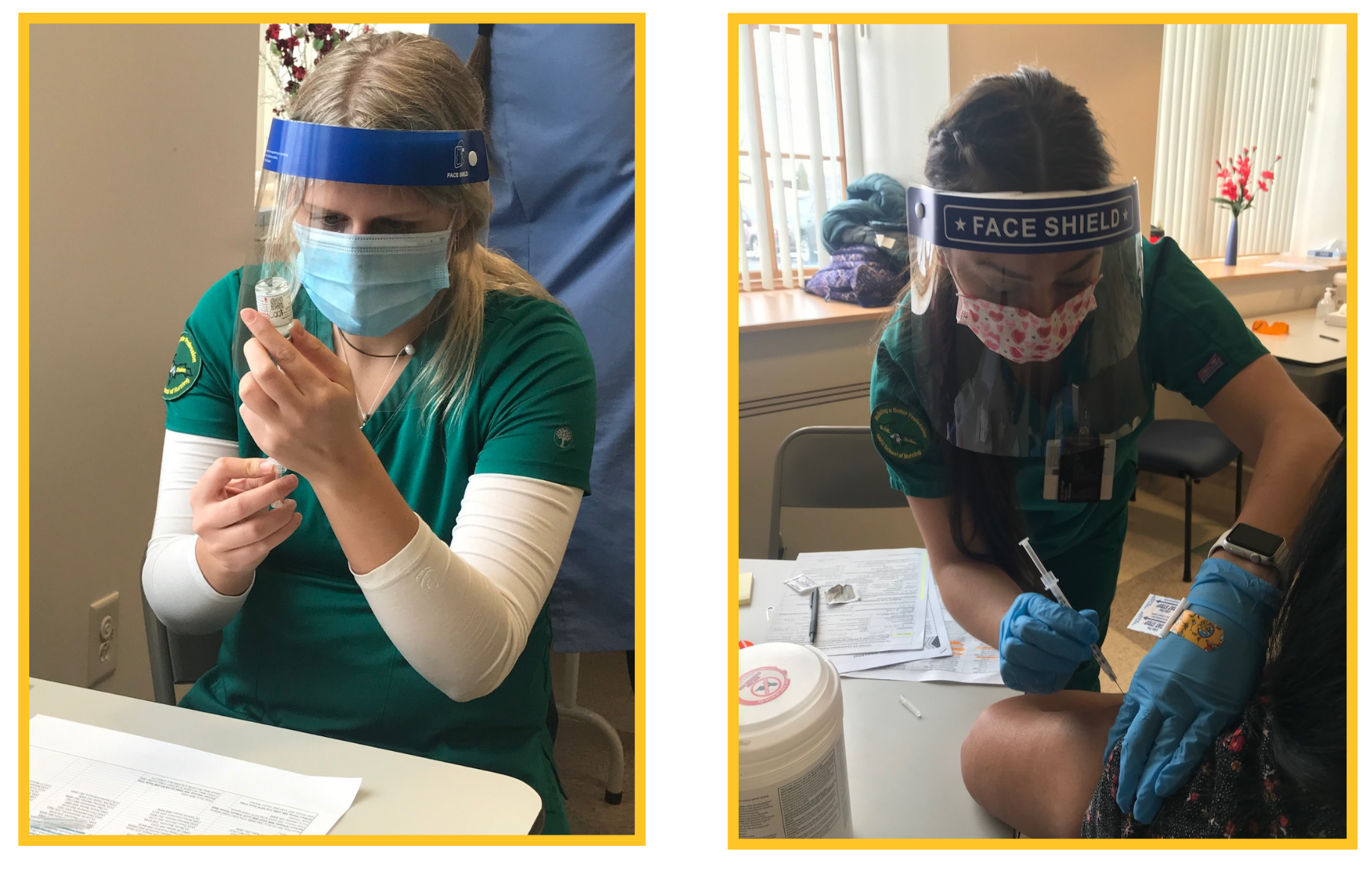For Northern Michigan University (NMU) students studying in healthcare fields, hands-on experience is irreplaceable. Due to the onset of the COVID-19 pandemic last year, many courses that normally involve in-person experience were restructured to an online setting. Last month, NMU nursing students who missed out on these experiences were able to gain it back during an immunization clinic at the Munising Sault Tribe Health Center, located in the Grand Island Chippewa Community Center.
Helen "Bitsy" Wedin, PhD, MBA, BA, FNP-BC, Professor of Nursing at NMU, worked with representatives from the tribal health center to staff an immunization clinic with students from her Nursing Care of Populations (NU 412) clinic course. According to the university’s course description, NU 412 requires applying processes learned from previous study in “selected community settings.”
“This particular batch of students (who worked the immunization clinic) were in our medical surg course a year ago when everything was shut down. That course is the meat and potatoes of the nursing program,” Wedin said. “There was no alternate or anything, it was just shut down and went online. It was, and it is, critical that we get them in for experience with procedures like this.”
The Sault Health Centers of the Chippewa Indians is a Federally Qualified Health Center (FQHC), meaning it is by definition a “community-based organization that provides comprehensive primary care and preventive care, to persons of all ages, regardless of their ability to pay or health insurance status.” They provide services in eight Upper Peninsula locations within seven counties, including: Escanaba, Hessel, Manistique, Marquette, Munising, Newberry, Sault Ste. Marie and Saint Ignace.

Right: NMU Nursing student administers an immunization shot to a Sault Tribe member
The connection between the NMU Nursing Program and the Munising Sault Tribe Health Center came via a current nursing student who is working at the center for his community rotation. This student happens to be working directly with an NMU alumna, Valerie Ford, who graduated from NMU with her LPN in 2010 and her BSN in 2017. She has been working at the tribal health center since 2018.
Practice has to be consistent across all of the Sault Health Center service areas. When the center in Sault Ste. Marie began working with students from Lake Superior State University it became possible for the other centers to work with students as well. This is how Ford was able to open up a conversation with Wedin about getting her students in for experience in a clinic setting. After being introduced, Ford and Wedin began discussing logistics for opportunities. An immunization clinic featuring the Moderna COVID-19 vaccine seemed to be an area where both the students and the center were able to benefit the most.
With 40 students in the NU 412 course, and 100 patients looking to be vaccinated, Wedin arranged six students to work two at a time in two hour intervals. The Munising Sault Tribe Health Center had 10 vials of the Moderna COVID-19 vaccine available that day, and each student was able to give seven to eight vaccinations.
“The most important thing really is that they talk to each patient and make them feel comfortable...it's not just ‘here’s your medicine, off you go,’' Wedin said. “They assisted with paperwork as well. With Moderna, everything has to line up. You need to make sure you have the right patient, the right birthdate and the lot number has to be confirmed.”
While the Pfizer vaccine requires a more complicated process, Moderna is a straight draw up. Wedin said this is good practice for nursing students.
For Ford, working with nursing students was not only a positive experience, but an asset to the health center. With their help, the clinic was able to increase their amount of vaccinators without having to obtain assistance from the various county locations.
“I’ve been a nurse for 11 years but an RN for only three, so I remember vividly what being a Nursing student was like,” Ford said. “To know exactly what semester they are in and what they are going through, it’s just fun to work with them. It’s a nice situation to be able to work with them and help them along.”
Another beneficial part of this experience was having students learn in a clinic environment. Being a smaller health clinic servicing a specific part of the population, patients are known on a more personal level. Many students are used to working in large hospitals with a high volume of patients and a busier, more fast paced environment. This is not always the most supportive place to learn.
Wedin said not only did the more intimate, personable environment make her students feel at ease, it also leant to the community experience as a whole.
“I’ve done a lot of these shot clinics where it’s so rushed and it’s just not good...but, this was wonderful,” she said. “From a community perspective I think it's really great for the patients, because not only did they get the vaccine, they also helped educate a nurse.”
The February immunization clinic with the Munising Sault Tribe Health Center marks the first opportunity the NMU Nursing Program has had to give vaccines during this pandemic, but it will not be the last. Students will be assisting the Sault Tribe Health Center of Munising during an immunization clinic for tribal members held at Northern Michigan University on Saturday, March 20. Students will also be assisting during a follow-up clinic for the Moderna vaccine in Munising on March 23.
For questions or comments in response to this post, please email ruralhealth@nmu.edu.
